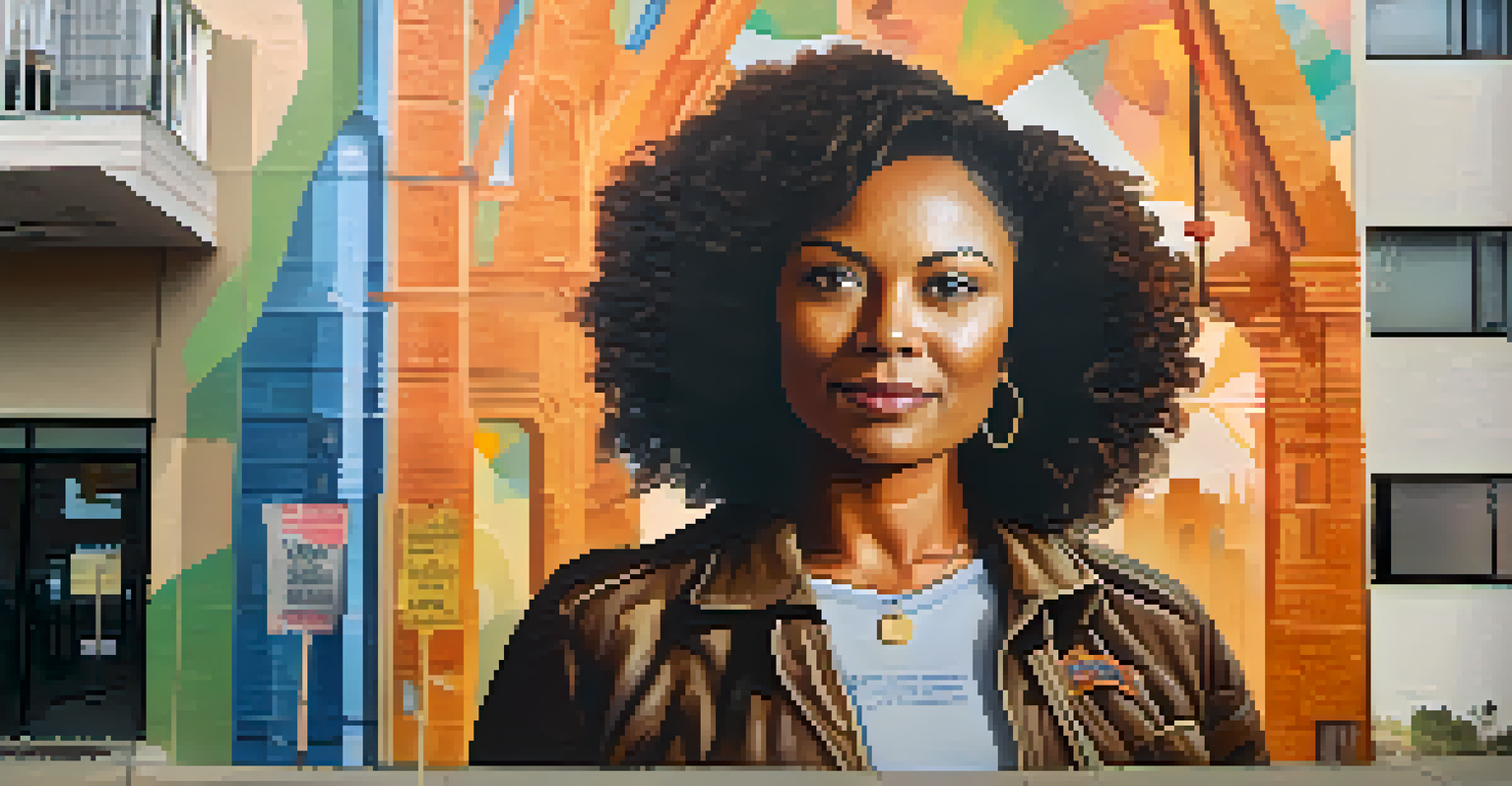How Philanthropy Shapes NYC's Social Justice Movements

Understanding Philanthropy in NYC's Landscape
Philanthropy in New York City is a powerful force, shaping not just the skyline but also the social fabric of the community. It encompasses donations from individuals, foundations, and corporations that aim to address various social issues. This commitment to giving is especially pronounced in a city known for its diversity and challenges, making it a hub for social justice initiatives.
Philanthropy is not about the money. It’s about using whatever resources you have at your fingertips and applying them to the betterment of the world.
In this vibrant city, philanthropists often focus on areas like education, housing, and health care, seeking to level the playing field for marginalized communities. For example, foundations may fund programs that support immigrant rights or initiatives promoting racial equity. These efforts not only provide immediate assistance but also aim to create long-term systemic change.
By investing in grassroots organizations and community leaders, philanthropy helps amplify the voices of those often overlooked in mainstream discourse. This support not only validates the struggles of these communities but also empowers them to advocate for their rights, fostering a more just society overall.
Historical Context of Philanthropic Efforts
To understand the current landscape, it’s essential to recognize the historical foundations of philanthropy in New York City. The city has a rich legacy of giving, dating back to the late 19th century with figures like Andrew Carnegie and John D. Rockefeller, who established charitable foundations that addressed pressing social issues. Their influence set the stage for a culture of philanthropy that persists today.

As the city evolved, so did the focus of philanthropic efforts. The civil rights movement of the 1960s, for instance, saw a surge in funding for organizations advocating for racial equality and justice. This historical context highlights how philanthropy has often played a pivotal role in supporting movements that challenge the status quo.
Philanthropy Shapes NYC's Community
Philanthropy in New York City plays a crucial role in addressing social issues and empowering marginalized communities through targeted initiatives.
Today, many of these historical foundations continue to impact social justice in NYC, adapting their missions to contemporary issues. Their ongoing support for initiatives like affordable housing and criminal justice reform underscores the lasting importance of philanthropy in the fight for social equity.
The Role of Corporate Philanthropy
Corporate philanthropy is an integral part of the philanthropic landscape in NYC, blending business interests with social responsibility. Many companies are now recognizing the need to give back to the communities where they operate, often resulting in substantial financial contributions to social justice causes. This trend not only helps those in need but also enhances the company’s brand image.
The greatness of a nation and its moral progress can be judged by the way its animals are treated.
For instance, tech giants and financial institutions often sponsor initiatives that promote workforce development and economic empowerment for underserved communities. By aligning their corporate social responsibility (CSR) efforts with social justice issues, these companies can make a meaningful impact while fostering loyalty among customers and employees alike.
However, it’s crucial to approach corporate philanthropy with a critical lens. While the financial support is beneficial, it can sometimes lead to an overshadowing of grassroots movements or a dilution of their messages. Ensuring that funding is directed in a way that empowers rather than co-opts social movements is vital for maintaining the integrity of these initiatives.
Grassroots Movements and Philanthropic Support
Grassroots movements are often at the forefront of social justice in NYC, and philanthropic support can be a game changer for these organizations. These movements, driven by community members, tackle local issues with passion and authenticity. However, funding is often a significant barrier to their success, making philanthropic backing crucial.
Philanthropic organizations frequently provide grants to grassroots groups, allowing them to scale their efforts and reach a broader audience. For example, funding can help these organizations run awareness campaigns, organize events, or provide essential services to those in need. This financial support strengthens their ability to advocate for change effectively.
Corporate Giving Affects Social Justice
Corporate philanthropy blends business interests with social responsibility, providing significant funding for social justice causes while raising questions about the impact on grassroots movements.
Moreover, philanthropy helps legitimize grassroots movements, bringing them into conversations with larger institutions and policymakers. By supporting these groups, philanthropists can help elevate the voices of those directly affected by social injustices, ensuring their stories and needs are heard in the broader narrative.
Challenges Facing Philanthropy in Social Justice
While philanthropy has a significant impact on social justice movements in NYC, it also faces various challenges. One major concern is the increasing demand for transparency and accountability from funders. Donors and organizations alike are urged to demonstrate the effectiveness of their contributions and ensure that funds are utilized responsibly.
Additionally, there’s the issue of funding priorities. Often, philanthropy can inadvertently prioritize certain causes over others, sidelining urgent issues that may lack visibility. For instance, while education and health care might receive ample funding, areas like environmental justice or housing may struggle to attract the same level of attention and resources.
Another challenge is the potential for philanthropy to create dependency rather than sustainable change. If organizations rely heavily on grants, they may struggle to build their revenue models or diversify funding sources. Striking a balance between providing necessary support and fostering self-sufficiency is crucial for the long-term success of social justice initiatives.
The Impact of Individual Philanthropy
Individual philanthropy plays a vital role in shaping NYC’s social justice movements, with many residents stepping up to support causes close to their hearts. This grassroots giving can range from small donations to larger contributions from high-net-worth individuals. Every dollar counts, and these contributions can significantly impact local organizations working tirelessly for change.
Moreover, individual philanthropists often bring unique perspectives and innovative ideas to the table. Their personal experiences can inform their giving strategies, allowing them to target specific issues that resonate with them. For example, a former educator may choose to support initiatives focused on educational equity, while a social worker might fund mental health programs.
Future Focus on Collaboration
The future of philanthropy in NYC will likely emphasize collaboration and inclusivity, ensuring that funding aligns with the needs of communities striving for social equity.
Additionally, individual giving fosters a sense of community and shared responsibility. When people contribute to causes they care about, it encourages others to get involved as well, creating a ripple effect that strengthens social justice movements. This collective action highlights the power of individuals in driving meaningful change within their communities.
Looking Ahead: The Future of Philanthropy and Social Justice
As we look to the future, the relationship between philanthropy and social justice in NYC is poised for evolution. The increasing awareness of social issues, fueled by movements like Black Lives Matter and climate activism, has prompted both established and new philanthropists to reconsider their approaches. There’s a growing recognition that addressing systemic inequalities requires not just funding, but a commitment to social change.
Philanthropy is likely to become more collaborative, with funders working together to pool resources and maximize impact. By forming coalitions, they can tackle complex issues more effectively and ensure that their efforts align with the needs of the communities they serve. This shift toward collaboration is essential for fostering a more equitable future.

Ultimately, the future of philanthropy in NYC's social justice movements will depend on the continued commitment of both funders and community leaders. By prioritizing transparency, inclusivity, and grassroots empowerment, philanthropy can play a transformative role in shaping a more just society for all New Yorkers.